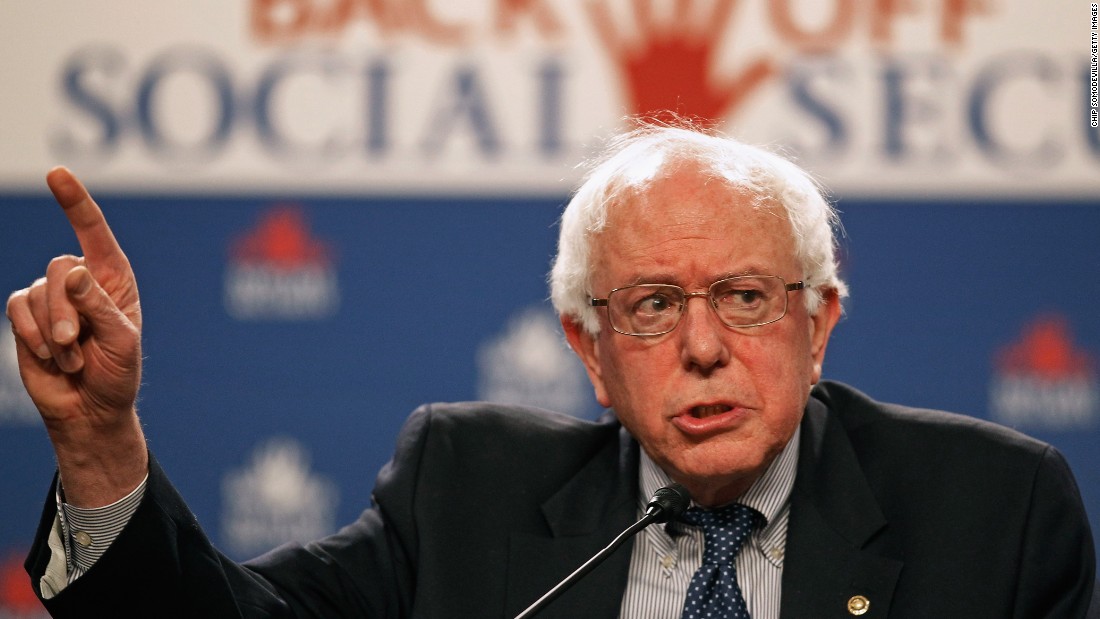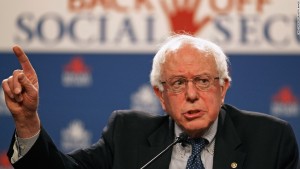“The top one-tenth of 1 percent in this country own almost 90 percent … as much wealth as the bottom 90 percent,” roared the independent senator from Vermont, Bernie Sanders, at the first Democratic primary debate of 2015, in Las Vegas.
Standing for president, Sanders implies, somehow, that there exists in nature a delimited income pie from which a disproportionate amount of wealth is handed over to, or seized, by a class of evil doers: “the rich.”
Clueless Sanders omits the process by which that wealth magically materializes.
Wealth doesn’t exist pristine in nature, until individuals—deserving as much, if not more, of the pope’s love as the poor—apply their smarts, labor and savings to transform raw materials into marketable things that satisfy human desire and need.
But not if one listens to the socialist from Vermont as, sadly, too many Americans did.
You ask, why was it not just as discouraging when even more Americans tuned in to watch the first and second Republican Primary Debates, 24 and 23 million respectively?
For this reason: While Republicans are never to be equated with freedom, smaller government, or anything remotely libertarian; the voting public equates a vote for a Republican with a vote for less government and more freedom from the state.
Therefore, an interest in and a support for a Democrat is often a reliable proxy for the measure of statism in the land.
Over fifteen million viewers tuned in to watch two washed-out, walking clichés of the hard left (Hillary Clinton and Mr. Sanders) join two other political phantoms no one had heard of before (Martin O’Malley and Lincoln Chafee), to malign and bring down their betters: the “highly productive and provident one percent that provides the standard of living of a largely ignorant and ungrateful ninety-nine percent,” in the words of professor George Reisman, author of the seminal “Capitalism: A Treatise on Economics.”
Countering Sanders’ pie-in-the-sky economics, Reisman notes that, “The wealth of the 1 percent is the overwhelming source of the supply of goods that people buy and of the demand for labor that people sell.” The wealth of the rich is not to be found in a huge pile of goods from which only capitalists benefit, but in the means of production that benefit us all.
When Hillary Clinton “cogitates” about capitalism, she “thinks,” by her own admission at the same forum, “about small businesses.”
How does this cunning—never clever—woman imagine big, “bad” business began? In a free market, small and “medium-sized businesses” grow to become bigger and bigger through the only pure, fair democracy in existence: the consumer’s vote of confidence; his hard-earned dollar.
By logical extension, self-made rich people were once less rich, even poor. Why make them the object of derision once they get wealthier, create more enterprises, employ more people, and provide a good life for their own families and workers—a standard of living these parties were without until Evil Rich Man In-The-Making arrived on the scene?
Here’s why: Since left-liberals struggle to think logically, they treat “The Rich” as a reified, rigid state-of-being. Liberals, the true evildoers, are unable to understand that “rich” is a process, a work in progress.
Wealth creation is a righteous process, at that, provided it is achieved in voluntary cooperation: by offering people consumer goods they want, buildings to live in, resorts to visit, all sans subsidies or special grants of government privilege.
Jews like Sanders have forgotten that riches are a reward for work well done. In the Jewish faith’s infinite wisdom, wealth justly acquired is a sign of God’s blessing.
Democratic socialism, under which we already labor today in the USA, turns on Karl Marx’s maxim, “From each according to his ability, to each according to his need.”
Sanders’ idea, shared by others on stage, is the unnatural notion that the government is entitled to seize a portion of your income; that it has a lien on your life and on what you acquire in the course of sustaining that life.
Be it Hillary or burn-the-wealth Bernie—both agree that it is up to them, the all-knowing central planners, to determine how much of your life ought to be theirs to squander.
Capitalism, conversely, is not a system! It is the uniquely human actions that flow from a moral right to make a living freely and peacefully, absent coercion; by relying on the sanctity of private property upheld by the rule of law.
The voluntary free market is a sacred extension of life itself. Its logic is based on the sanctity of private property rights, beginning with the individual‘s title in his or her own body. Capitalism’s starting point is with the most important liberty of all: individual self-ownership.
The free market—it has not been unfettered for a very long time, courtesy of the political class—is really a spontaneously synchronized order, comprising trillions upon trillions of voluntary acts performed by individuals to sustain life.
So which is the philosophy of a free people? Capitalism, “the unknown ideal” (for nowhere is it practiced), or democratic socialism, that partial enslavement of a “system” espoused by Sanders and Clinton?
Tell me, too, how is it that Bernie Sanders is not laughed off the podium in 21st century America? Why are he and the harridan Hillary able to porcelainize and romanticize an ideology, democratic socialism, that’ll lead to further nationalization of a good deal of the means of production? How is it that, as a Gallup poll revealed, only “half the country would not put a socialist in the White House”?
This puzzle was explained succinctly and profoundly by another great economist.
In the introduction to F.A. Hayek’s “The Road to Serfdom,” Milton Friedman put his finger on the backdrop to the growth of collectivism:
The argument for collectivism is simple if false; it is an immediate emotional argument. The argument for individualism is subtle and sophisticated; it is an indirect rational argument.
Marxism, socialism and its offshoot democratic socialism engage the gut, or the uterus, in the case of Hillary Clinton. Free-market capitalism engages the rational mind.
To his brilliantly stated aphorism, Dr. Friedman forgot to add this: Individualism and the economy of freedom is also the philosophy of justice.
–Ilana Mercer
Ilana Mercer is a paleolibertarian writer, based in the U.S. She is a contributor to Junge Freiheit, Germany’s finest weekly, and is a fellow at the Jerusalem Institute for Market Studies. Her latest book is “Into the Cannibal’s Pot: Lessons For America From Post-Apartheid South Africa.” Her website iswww.IlanaMercer.com. Follow her on Twitter. “Friend” her on Facebook.


